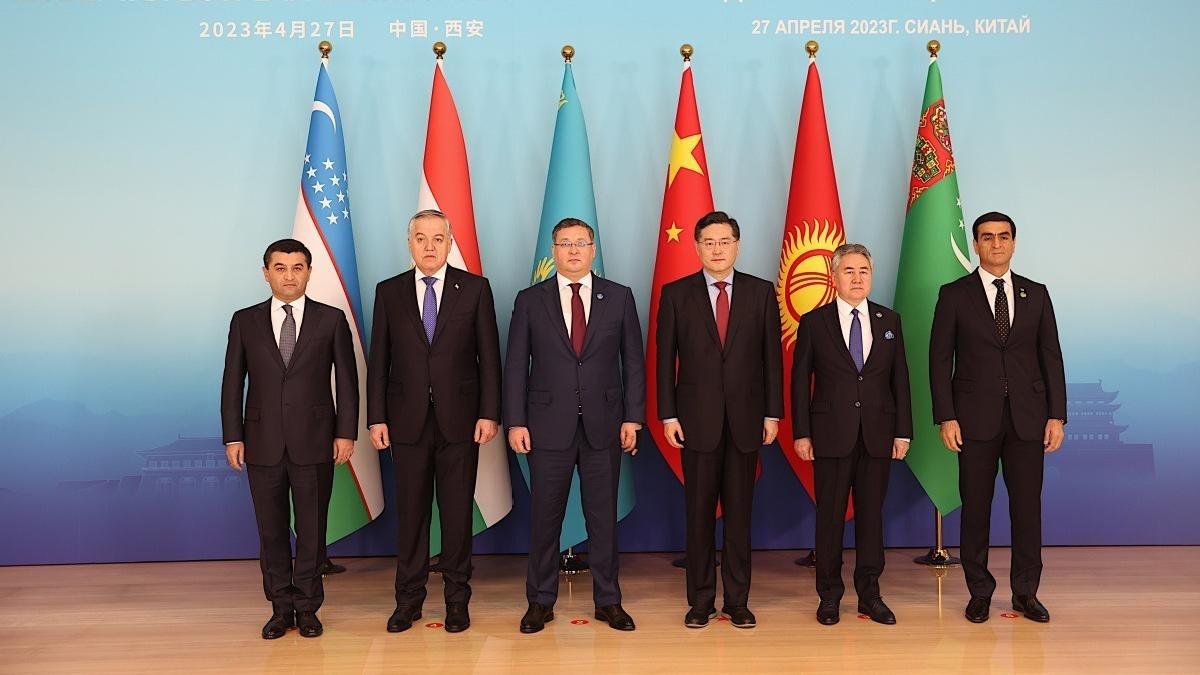 Chinese State Councilor and Foreign Minister Qin Gang (third right) poses for photos with foreign ministers from Kazakhstan, Kyrgyzstan, Tajikistan, Turkmenistan and Uzbekistan before the 4th China-Central Asia Foreign Ministers' Meeting in Xi'an, Shaanxi province, China, on April 27, 2023. (FENG YONGBIN / CHINA DAILY)
Chinese State Councilor and Foreign Minister Qin Gang (third right) poses for photos with foreign ministers from Kazakhstan, Kyrgyzstan, Tajikistan, Turkmenistan and Uzbekistan before the 4th China-Central Asia Foreign Ministers' Meeting in Xi'an, Shaanxi province, China, on April 27, 2023. (FENG YONGBIN / CHINA DAILY)
Event expected to enhance cooperation, promote solidarity among the six nations
President Xi Jinping will host heads of state from Kazakhstan, Kyrgyzstan, Tajikistan, Turkmenistan and Uzbekistan on Thursday and Friday in Xi'an, Shaanxi province, for the China-Central Asia Summit, a milestone event that is expected to boost the countries' economic cooperation and jointly tackle the region's security challenges at a higher level.
The summit takes place against the backdrop of the lingering effects of the COVID-19 pandemic, mounting geopolitical competition and the ongoing Ukraine crisis.
Mariam Shah, an independent researcher of conflict studies and military psychology in Islamabad, Pakistan, said that the Xi'an summit shows China's successful diplomatic efforts and growing regional influence by establishing comprehensive strategic partnerships with all five Central Asian countries, demonstrating high levels of trust and cooperation
It is also taking place as the G7 Summit is due to be held from Friday to Sunday in Hiroshima, Japan. The G7 member states are expected to issue a statement on "economic security" that is likely to highlight issues such as countering China's so-called "economic coercion" and ending "dependence" on China in fields such as semiconductors and critical minerals.
READ MORE: China urges G7 not to be accomplice to economic coercion
Analysts said that the two summits would differ greatly in their outlook and approach.
They said that the G7 Summit would see Western nations, led by the United States, strive to build small circles that would further divide the international community and even create confrontation.
In marked contrast, the China-Central Asia Summit will help to strengthen solidarity and cooperation among countries in promoting economic recovery as well as regional peace and stability.
Mariam Shah, an independent researcher of conflict studies and military psychology in Islamabad, Pakistan, said that the Xi'an summit shows China's successful diplomatic efforts and growing regional influence by establishing comprehensive strategic partnerships with all five Central Asian countries, demonstrating high levels of trust and cooperation.
Head-of-state diplomacy enhances mutual trust, establishes cooperation mechanisms, and overcomes political obstacles, Shah said.
ALSO READ: Xi calls for strengthening friendship with Central Asia
"One of the most important highlights is President Xi's active involvement and personal engagement in the summit, highlighting China's commitment to strengthening ties with Central Asian countries."
At a virtual summit last year commemorating the 30th anniversary of diplomatic relations between China and Central Asian countries, the presidents of the six countries jointly announced the building of a China-Central Asia community with a shared future, and the China-Central Asia cooperation mechanism came into being, characterized by openness, transparency, mutual benefit, equality, reciprocity and real results.
Addressing the virtual event, Xi said that the key to successful cooperation between China and the five Central Asian countries is their abiding commitment to mutual respect, good-neighborly friendship, solidarity in trying times and mutual benefit.
The Foreign Ministry has said that during the Xi'an summit, the presidents of the six countries will exchange views on the development of the China-Central Asia mechanism, cooperation in various sectors and major international and regional issues of common interest, draw up a new blueprint for China-Central Asia relations and usher in a new era for cooperation between the two sides
The Foreign Ministry has said that during the Xi'an summit, the presidents of the six countries will exchange views on the development of the China-Central Asia mechanism, cooperation in various sectors and major international and regional issues of common interest, draw up a new blueprint for China-Central Asia relations and usher in a new era for cooperation between the two sides.
Fruitful outcomes in political, economic and security areas are expected as the participants seek new cooperation agreements.
Shakhrat Nuryshev, the Kazakh ambassador to China, said that the primary objective of the summit is to initiate a new stage of cooperation between Central Asian countries and China.
READ MORE: Xi to chair China-Central Asia Summit
"An important point is that the Central Asian region is seen here as an integral entity, not divided into five separate nations, but rather engaging with China in unity in the spirit of neighborly friendship. Therefore, we keenly anticipate it," Nuryshev said in an article published on the website of China Global Television Network.
BRI collaboration
Central Asia is where the Belt and Road Initiative was proposed, and it is also one of the regions to have reaped the early fruits of the initiative.
China's trade with the five countries increased to $70.2 billion in 2022 from $460 million in 1992, when China established diplomatic ties with the nations.
ALSO READ: Belt and Road promoting common development
Investment cooperation has also benefited all sides. As of the end of March, China's direct investment stock in the five Central Asian countries stood at over $15 billion. The cumulative turnover of completed projects reached $63.9 billion, according to the Ministry of Commerce.
The summit in Xi'an, historically known as Chang'an, the starting point of the ancient Silk Road, will further build up the consensus between China and the Central Asian countries on high-quality development of the Belt and Road, and enable them to continue to act as the pacesetter of BRI cooperation, Foreign Ministry spokesman Wang Wenbin said at a regular news conference on Tuesday.


